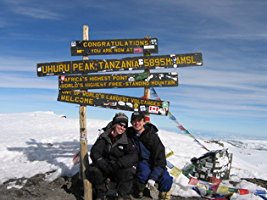December 2011, Mt. Kilimanjaro Base Camp, Nalemoru, Tanzania: The porters and guides gawked and giggled. They had never seen a climber this large on Mt. Kilimanjaro. They called her Mama Kubwa, Swahili for ‘big woman.’ At 300 pounds, Kara Whitely was the biggest woman they had ever seen attempt to climb the mountain.
Each year an average of 26,000 people attempt to climb 19,343-foot Mt. Kilimanjaro, Africa’s tallest peak. It takes 5 days of trail walking, almost 50 miles, to get to the summit, and only 66% make it to the top. The porters quietly made bets among themselves that Whitely would not be one of them.
Whitely’s struggle with her weight began at age nine. After her parents divorced, she numbed her pain with trips to the pantry and refrigerator. Classmates had joked about her weight. There were no high school prom dates; she bagged groceries after school. At her high school graduation Whitely weighed 200 pounds and had added another 100 pounds to her six-foot frame when she received her college diploma.
In 2004, to celebrate losing 120 pounds, Whitely and her new husband successfully summited Mt. Kilimanjaro. In December 2009, on her 2nd attempt, with less than 2 miles to go, Whitely quit. Disappointed, defeated, and unprepared she told her family that she had a stomach virus, but they knew it was the 60 pounds she had regained.
In 2011, Whitely, a newspaper reporter had the chance to go back to Kilimanjaro with a group from the Global Alliance for Africa’s AIDS Orphans program. She thought successfully climbing the mountain again would make her seven-year-old daughter proud and redeem her failure from two years before. At base camp, Whitely was keenly aware of the porter’s reaction. When she tried on her 2 pairs of hiking pants they wouldn’t fit over her thighs. Ashamed and embarrassed, she found a seamstress in the village to combine the two pair into one.
By the second night, after 10 hours of hiking, Whitely regretted her decision. Lying in her tent, exhausted and nursing aching muscles, she could hear the porters saying her name and roaring with laughter. She knew she did not belong on the mountain. She had planned to lose 100 pounds before the climb and she hated herself for not training and for refusing to say no to pies, cookies, candy, and chips. But then her regrets turned to anger; she would show the porters. She whispered to herself, “Never judge a girl by her blubber, there’s no way I’m quitting now.”
On the fourth night, Whitely’s group camped at 16,000 feet, a six-mile hike from the summit. At 3 A.M. the following morning they set out for the summit. With a mile to go, Whitely had a pounding headache, felt nauseous, and was gasping for breath. Her thighs burned with each step, and she could barely put one foot in front of other one. It was minus 10 degrees and the water bottles were frozen, her mouth was dry and she badly needed water. She could not lie to her family again. She was the last hiker in her group to reach to summit but Whitely touched the 19,343-foot elevation at the peak a couple hours after sunrise. The other climbers and the porters were waiting for her and cheering for Whitely to finish – none of them thought she could. The porters no longer called her Mama Kubwa; they now referred to her as Unaweza, Swahili for “You can do it.”
Today, Kara Whitely is a motivational public speaker and American Hiking Society ambassador. She has written for Redbook, Runner’s World, and Weight Watchers magazines. She has appeared on Oprah, Good Morning America, and is a National Binge Eating Recovery Advocate for the Eating Recovery Center. She continues to do battle with her weight.
Like Kara Whitely, we all have obstacles and challenges on our paths. The New Year can be a time to begin again – to commit to tackle again the obstacles standing in the way of our dreams. God gives us dreams a size too big so that we can grow into them. Think big, start small, but start.
“It is not the mountain we conquer, but ourselves.” Sir Edmund Hillary
